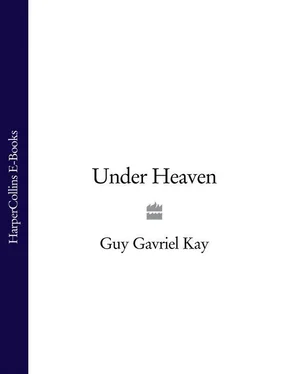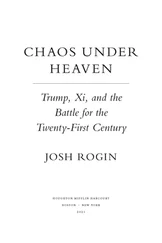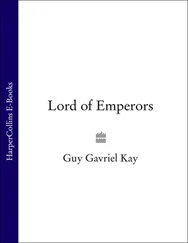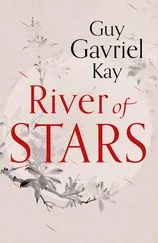There would be music and glory, heartbreak and heart’s ease, and knives or swords drawn sometimes in the lanes and alleys. And come morning, power and passion and death all over again, jostling each other in the two great, deafening markets, in wine shops and study halls, twisted streets (shaped for furtive love, or murder) and stunningly wide ones. In bedrooms and courtyards, elaborate private gardens and flower-filled public parks where willows drooped over streams and the deep-dredged artificial lakes.
He remembered Long Lake Park, south of the rammed-earth city walls, remembered with whom he’d been there last, in peach-blossom time, before his father died, on one of the three days each month she was allowed out of the North District. Eighth, eighteenth, twenty-eighth. She was a long way off.
Wild geese were the emblems of separation.
He thought of the Ta-Ming, the whole palace complex north of the city walls, of the Son of Heaven, no longer young, and of those with him and around him there: eunuchs, and nine ranks of mandarins, Tai’s older brother one of them, princes and alchemists and army leaders, and the one almost surely lying with him tonight under this moon, who was young, and almost unbearably beautiful, and had changed the empire.
Tai had aspired to be one of those civil servants with access to palace and court, swimming “within the current,” as the phrase went. He had studied a full year in the capital (between encounters with courtesans and wine-cup friends), had been on the brink of writing the three-day exams for the imperial service, the test that determined your future.
Then his father had died by their quiet stream, and two and a half years of official mourning came, and went from you like a rainwind down a river.
A man was lashed—twenty with the heavy rod—for failing to perform the withdrawal and rituals due to parents when they died.
You could say (some would say) he had failed in the rites by being here in the mountains and not at home, but he’d spoken with the sub-prefect before riding this long way west, and had received permission. He was also—overwhelmingly—still withdrawn from society, from anything that could be called ambition or worldliness.
There was some risk in what he’d done. There was always danger when it came to what might be whispered at the Ministry of Rites, which supervised the examinations. Eliminating a rival, one way or another, was as basic a tactic as there was, but Tai thought he had protected himself.
You could never truly know, of course. Not in Xinan. Ministers were appointed and exiled, generals and military governors promoted, then demoted or ordered to kill themselves, and the court had been changing swiftly in the time before he’d left. But Tai hadn’t had a position yet. It wasn’t as if he’d risked anything in the way of office or rank. And he thought he could survive the whipping rod, if it came to that.
He tried to decide now, in a moonlit cabin, wrapped in solitude like a silkworm during its fourth sleep, how much he really missed the capital. If he was ready to go back, resume all as before. Or if it was time for yet another change.
He knew what people would say if he did make a change, what was already said about General Shen’s second son. First Son Liu was known and understood, his ambition and achievement fitting a pattern. The third son was still young, little more than a child. It was Tai, the second, who raised more questions than anything else.
Mourning would be formally over at the seventh month’s full moon. He would have completed the rites, in his own fashion. He could resume his studies, prepare for the next set of examinations. That was what men did. Scholars wrote the civil service tests five times, ten, more. Some died without ever passing them. Forty to sixty men succeeded each year, of the thousands who began the process with the preliminary tests in their own prefectures. The final examination was begun in the presence of the emperor himself, in his white robe and black hat and the yellow belt of highest ceremony: an elaborate passage of initiation—with bribery and corruption in the process, as always in Xinan. How could it be otherwise?
The capital seemed to have entered his silvered cabin now, driving sleep farther away with memories of a brawling, buffeting tumult that never wholly stopped at any hour. Vendors and buyers shouting in the markets, beggars and tumblers and fortune tellers, hired mourners following a funeral with their hair unbound, horses and carts rumbling through dark and day, the muscled bearers of sedan chairs screaming at pedestrians to make way, whipping them aside with bamboo rods. The Gold Bird Guards with their own whipping rods at every major intersection, clearing the streets when darkfall came.
Small shops in each ward, open all night long. The Night Soil Gatherers passing with their plaintive warning cry. Logs bumping and rolling through Xinan’s outer walls into the huge pond by the East Market where they were bought and sold at sunrise. Morning beatings and executions in the two market squares. More street performers after the decapitations, while good crowds were still gathered. Bells tolling the watch-hours by day and through the night, and the long roll of drums that locked the walls and all the ward gates at sundown and opened them at dawn. Spring flowers in the parks, summer fruit, autumn leaves, the yellow dust that was everywhere, blowing down from the steppes. The dust of the world. Jade-and-gold. Xinan.
He heard and saw and almost caught the smells of it, as a remembered chaos and cacophony of the soul, then he pushed it back and away in the moonlight, listening again to the ghosts outside, the crying he’d had to learn to live with here, or go mad.
In silver light he looked over at his low writing table, the ink-block and paper, the woven mat in front of it. His swords were against the wall beside it. The scent of the pine trees came through the open windows with the night wind. Cicadas whirring, a duet with the dead.
He had come to Kuala Nor on impulse, to honour his father’s sorrow. He had stayed for himself just as much, working every day to offer what release he could to however small a number of those unburied here. One man’s labour, not an immortal, not holy.
Two years had passed, seasons wheeling, and the stars. He didn’t know how he would feel when he returned to the crash and tumble of the capital. That was the honest thought.
He did know which people he had missed. He saw one of them in the eye of his mind, could almost hear her voice, too vividly to allow sleep to return, remembering the last time he’d lain with her.
“And if someone should take me from here when you are gone? If someone should ask me…should propose to make me his personal courtesan, or even a concubine?”
He’d known who someone was, of course.
He had taken her hand, with its long, gold-painted fingernails and jewelled rings, and placed it on his bare chest, so she could feel his heart.
She’d laughed, a little bitterly. “No! You always do this, Tai. Your heart never changes its beating. It tells me nothing.”
In the North District where they were—an upstairs room in the Pavilion of Moonlight Pleasure House—she was called Spring Rain. He didn’t know her real name. You never asked the real names. It was considered ill-bred.
Speaking slowly, because this was difficult, he’d said, “Two years is a long time, Rain. I know it. Much happens in the life of a man, or a woman. It is—”
She had moved her hand to cover his mouth, not gently. She wasn’t always gentle with him. “No, again. Listen to me. If you begin to speak of the Path, or the balanced wisdom of life’s long flowing, Tai, I will take a fruit knife to your manhood. I thought you might wish to know this before you went on.”
Читать дальше












